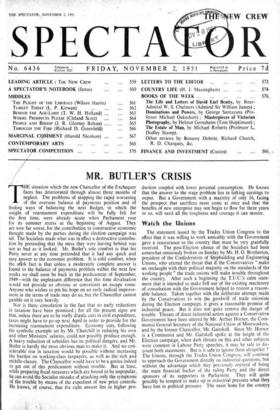MR. BUTLER'S CRISIS
THE situation which the new Chancellor of-the Exchequer faces has deteriorated through almost three months of neglect. The problems of stopping the rapid worsening of the overseas balance of payments position and of finding ways of balancing the next Budget, in which the weight of rearmament expenditure will be fully felt for the first time, were already acute when Parliament rose for its summer recess at the beginning of August. They are now far worse, for the contribution to constructive economic thought made by -the parties during the election campaign was nil. The-Socialists made what was in effect a destructive contribu- tion by pretending that the mess they were leaving behind was not as bad as it looked. Mr. Butler's sole comfort is that his Party never at any time pretended that it had any quick and easy answer to the economic problem. It is cold comfort, when the dirk fact is that unless a moderately complete answer is found to the balance of payments problem within the next few weeks we shall soon be back in the predicament of September, 1949—with the unpleasant difference that this time devaluation would not provide so obvious or convenient an escape route. Anyone who wishes to pin his hope on an early radical improve- ment in the terms of trade may do so, but the Chancellor cannot gamble on it very heavily.
Nor is there consolation in the fact that no early reductions in taxation have been promised ; for all the present signs are that,.unless there are to be really drastic cuts in civil expenditure, taxes might have to go up next April in order to provide for the increasing rearmament expenditure. Economy cuts, following the symbolic example set by Mr. Churchill in redticing his own and other Ministers' salaries, could not possibly produce enough. A heavy reduction of subsidies has its political dangers, and Mr. Butler is hardly the most obvious man to make it. And no cod- siderable rise in taxation would be possible without increasing the burden on working-class taxpayers, as well as the rich and middle-classes. The Chancellor would have to be a genius indeed to get out of this predicament without trouble. But at least, while preparing fiscal measures which are bound to be unpopular, he can avoid the. Socialist mistake of attacking only the symptoms of the trouble by means of the expedient of new price controls: He knows, of course, that the right answer lies in higher pro- duction coupled with lower personal consumption. He knows that the answer to the wage problem lies in linking earnings to ouput. But a Government with a majority of only 16, facing the prospect that sacrifices must come at once and that the benefits of new enterprise may not begin to flow for three years or so, will need all the toughness and courage it can muster.


































